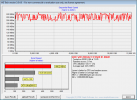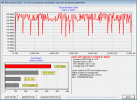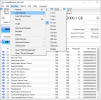FrozenPhoton
New Member
Hello, I have Hwinfo constantly running in the background on my PC as it feeds the data for needed for my modern gadgets rainmeter skin which I love having in view at all times. Recently, I've noticed that two of my Spinning HDDs are making a clicking noise that sounds like the drive head parking every ~3 seconds, like some kind of digital heartbeat inside my PC. This was driving me insane as I couldn't find the source of it for WEEKS of googling until I came across this LTT forum post that helped me ID the issue as originating from HWinfo (they cite AIDA64 in the thread, but both must be doing the same thing under the hood).
So a bit more detail, I have 4 spinning HDDs in my system:
1x WD 3TB (WDC WD30EZRX-22D8PB0)
1x Seagate 1.5TB (ST1500DL003-9VT1)
2x Seagate 1TB (ST31000528AS)
By removing the SATA power cables one by one, I pinned down the issue to only be occuring with only my 2x 1TB seagate drives from the list above, not the other two. Shutting down HWinfo stopped the noise. Going further into the settings, I realized that I could still get HWinfo to run and not poll the drives constantly by going into Settings -> Safety -> IDE/(S)ATA drive scan and chaing the radio button to "Disable Drive Scan".
While this stops the noise, I no longer have access to the temperature sensor within the drives for my Modern Gadgets plugin. Below are screencaps with HWinfo set to Safe Mode (left) and Drive Scan Disabled (right). Low-Level IO is no different from Safe Mode with respect to the temp sensor and clicking noise.


Alternatively, I found via trial an error that disabling S.M.A.R.T on the drive (leaving the Drive scan in safe mode) stops the noise from occuring, but still prevents access to the HDD temp sensor on ALL my drives.
I'd like to still have access to this sensor, but at a much lower polling rate (Say, every few minutes rather than every 2-3 seconds). Could this feature be user defined like the screencap from AIDA64 in the LTT thread I linked above? Or perhaps is there a way to obtain information from the drives in a passive way, as is the case for my other 1.5TB and 3TB drives that don't seem to park the read head constantly when pulling data from the sensor. Or could it be defined on a drive-by-drive basis? I know this is partially out of your hands and a question for Seagate with respect to what is different about these drives, but looking up this issue in past forum threads its come up before with Seagate drives (I think):
Example 1
Example 2
I've tried disabling the CSMI SAS support box (as I think these two are SAS drives) but that didn't do anything.
Apologies if my question has been asked in the past, but I'm just trying to get to a state where I can monitor my drive temps (at least for the drives that are NOT having this issue) and not deal with this insane clicking noise
Thanks for reading this far!
So a bit more detail, I have 4 spinning HDDs in my system:
1x WD 3TB (WDC WD30EZRX-22D8PB0)
1x Seagate 1.5TB (ST1500DL003-9VT1)
2x Seagate 1TB (ST31000528AS)
By removing the SATA power cables one by one, I pinned down the issue to only be occuring with only my 2x 1TB seagate drives from the list above, not the other two. Shutting down HWinfo stopped the noise. Going further into the settings, I realized that I could still get HWinfo to run and not poll the drives constantly by going into Settings -> Safety -> IDE/(S)ATA drive scan and chaing the radio button to "Disable Drive Scan".
While this stops the noise, I no longer have access to the temperature sensor within the drives for my Modern Gadgets plugin. Below are screencaps with HWinfo set to Safe Mode (left) and Drive Scan Disabled (right). Low-Level IO is no different from Safe Mode with respect to the temp sensor and clicking noise.
Alternatively, I found via trial an error that disabling S.M.A.R.T on the drive (leaving the Drive scan in safe mode) stops the noise from occuring, but still prevents access to the HDD temp sensor on ALL my drives.
I'd like to still have access to this sensor, but at a much lower polling rate (Say, every few minutes rather than every 2-3 seconds). Could this feature be user defined like the screencap from AIDA64 in the LTT thread I linked above? Or perhaps is there a way to obtain information from the drives in a passive way, as is the case for my other 1.5TB and 3TB drives that don't seem to park the read head constantly when pulling data from the sensor. Or could it be defined on a drive-by-drive basis? I know this is partially out of your hands and a question for Seagate with respect to what is different about these drives, but looking up this issue in past forum threads its come up before with Seagate drives (I think):
Example 1
Example 2
I've tried disabling the CSMI SAS support box (as I think these two are SAS drives) but that didn't do anything.
Apologies if my question has been asked in the past, but I'm just trying to get to a state where I can monitor my drive temps (at least for the drives that are NOT having this issue) and not deal with this insane clicking noise
Thanks for reading this far!



